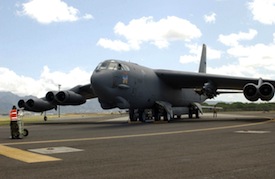Counting and Trimming Nuclear Bombers under New START
April 2, 2010
Featured Image
We are happy to serve you a daily summary of the day's top nuclear policy stories each morning, with excerpts from the stories in bullet form.
Stories we're following today:
New Treaty Could Trim Nuclear Role of Bombers - Air Force Times [link]
- The new START treaty that would cut the number of U.S. and Russian nuclear weapons could also prompt the United States to trim the bomber leg of its nuclear force.
- If the number of deployed launchers must be reduced to 700, the U.S. military is likely to want most of them to be its most responsive and survivable, said Tom Collina of the Arms Control Association. That suggests keeping the maximum number of land-based and sea-based ballistic missiles. “We could be moving to 20 or fewer bombers.”
- Under the new treaty, each bomber counts as one weapon even though U.S. bombers can carry more than one warhead. A fleet of 16 B-2s could carry 256 nuclear weapons and four B-52s could carry 80 more. An all-B-52 fleet could carry 400.
- The new START treaty “will still leave the United States and Russia with thousands of excess nuclear weapons that are liabilities in the effort to curb proliferation and combat terrorism,” said Daryl Kimball, executive director of the Arms Control Association.
- “[The treaty is] a modest achievement in terms of limits” on nuclear weapons, “but significant in terms of extending a modern verification regime, and most important, getting the ball rolling again in these types of nitty-gritty talks between the United States and Russia. That’s where the value is,” said Hans Kristensen of the Federation for American Scientists.
Obama Urges China's Hu to Get Behind Iran Push - Reuters [link]
- President Barack Obama urged his Chinese counterpart Hu Jintao to help ratchet up pressure on Iran over its nuclear activities, but Hu did not openly commit to new sanctions on Tehran, according to official reports on Friday.
- "We're going to ratchet up the pressure (on Iran) and examine how they respond but we're going to do so with a unified international community," Obama said.
- Together with China's announcement on Thursday that Hu will attend a nuclear security summit in Washington this month, the talk between the leaders reflected easing tensions between Washington and Beijing after a spasm of disputes.
Obama No Closer on Nuclear Test Ban Ratification - Associated Press [link]
- The hard-negotiated [New START Treaty] took so long to conclude it has jeopardized Obama's chances to achieve another nuclear goal: Senate ratification of a nuclear test ban treaty.
- The administration had hoped that success with Russia on [the New START Treaty] would give it momentum for winning Senate approval of the Comprehensive Test Ban Treaty. Both treaties must be ratified to go into force, but time constraints mean that the Senate will only consider one of the two before the November midterm elections.
- That bodes ill for the test ban treaty, which will come second. "It's just not going to happen," said Joseph Cirincione, president of the Ploughshares Fund, which advocates the elimination of nuclear weapons. "Not this year."
- For its part, the administration is not ready to be so specific about the time frame. ''The president is committed to pursuing ratification'' of the test ban treaty, National Security Council spokesman Ben Chang said.
The Little Nukes that Got Away - David Hoffman in Foreign Policy [link]
- The just-completed strategic weapons treaty that U.S. President Barack Obama will sign in Prague next week with Russian President Dmitry Medvedev does not cover smaller nuclear warheads in both arsenals that are a legacy of the Cold War -- the so-called battlefield, or tactical weapons.
- These smaller warheads have never been covered by a specific treaty, nor are they subject to the kind of verification that is used to prevent cheating in the agreements covering the long-range or strategic weapons. What's more, they are relics of a bygone era, with no military usefulness.
- The United States and others have been reluctant to unilaterally withdraw the weapons… An even bigger question mark is whether Russia would be willing to reduce its pile of small nuclear weapons.
- Fortunately, there are far fewer warheads on both sides today. And Russian storage facilities are probably more secure than in 1991. But those weapons that remain seem to stubbornly elude arms control.
The Lighter Side
Nuclear Bombs Expose Fake Wines - Scientific American [link]
- Graham Jones at Australia’s University of Adelaide thought he could use bomb information against counterfeit wines.
- For thousands of years, the ratio between carbon 14 and carbon 12 has been the same. But those two decades of [atmospheric] atomic bomb tests increased the C-14 in the atmosphere. And as growing grapes absorb carbon dioxide, they take in trace amounts of the heavier carbon isotope—which eventually show up in the wine.
- The research team checked C-14 levels in 20 Australian red wines with vintages from 1958 to 1997. They compared the wine’s C-14 to C-14 in atmospheric samples from the same years. And found a direct match—C-14 levels could give away the vintage year for each wine.



